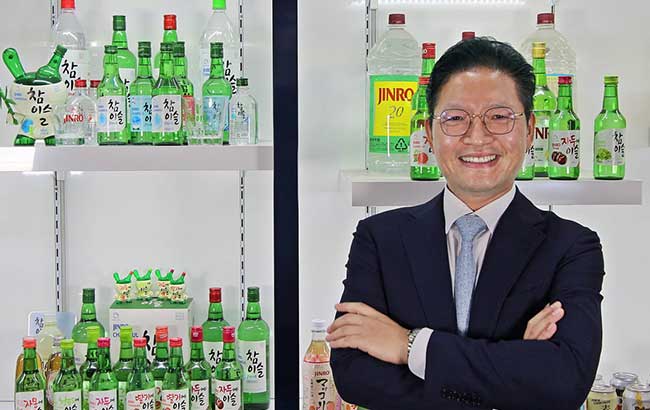This website uses cookies so that we can provide you with the best user experience possible. Cookie information is stored in your browser and performs functions such as recognising you when you return to our website and helping our team to understand which sections of the website you find most interesting and useful.
SB meets… Hwang Jung-Ho, Hite-Jinro
We caught up with the managing director for soju brand Hite-Jinro to discuss the company’s target market and plans for growth.

How does sponsoring a UK music festival for the first time present Jinro with new opportunities?
The All Points East festival is in Britain, and the visitors are of a young generation – my consumer target is the younger generation. This is a good opportunity for them to [get to know] my soju, Jinro, through this experience.
What about the spirit appeals to the younger generation?
There is currently a K-culture wave – K-pop, K-drama, K-film. These show people drinking soju [on screen]. It’s featured on Parasite and Netflix’s Squid Game. And through this, people are more interested in Korea and drinking from the film or music and naturally they are more interested in Korean things.
I am also very happy to see the Korean dining scene in London has some great places, which are encouraging western audiences to try Korean food – like restaurant Korean Dinner Party.
The younger generation is also interested in lower-ABV right now, as well as their own wellbeing. We have original Jinro, but we’ve also introduced some new flavours which have a lower ABV.
What did you learn about partnering with Honest Burgers recently?
We want people to know that Jinro goes well with food, and not just Korean food. If you take the elements of Korean food. which is a balance of salt and sweet and spice, and usually some barbecue or grill element, then this is the perfect backdrop for Jinro. So, Honest Burgers is a great example of the drink traversing cuisines.
We look forward to executing more of these campaigns in the future and hope to discover some surprising combinations.
How does Jinro fit into cocktail culture?
Regular Jinro is used for cocktails because it has a higher ABV. Traditionally, we would recommend drinking the flavoured range on it’s own or with soda, but we have been surprised and delighted by the ingenuity of our UK partner Noel Venning from Three Sheets.
He has developed some incredible cocktails that took our flavoured range into a new dimension and also supported our enthusiasm for low-alcohol cocktails.
Using Jinro for cocktails means an alternative option to using distilled spirits as a base, and adding other elements such as various flavours and carbonated water. I must also note that Jinro is also ideal to drink on its own and is a welcome alternative to cocktails and it does not contain additives.
What does the future look like for the brand in the on-trade, here in the UK?
For the on-trade we are welcoming many new listings who are seeing interest from customers for Jinro. We support this with a robust marketing and PR structure. We see growth in the younger audience and look forward to continuing our partnerships to showcase the versatility and approachability of Jinro.
Do you have any more plans for activations like this one?
At the moment we don’t have any specific plan, but more festivals are a possibility.
How is Jinro performing in the on-trade in Korea, especially after the pandemic?
Despite the pandemic in Korea, we have increased domestic sales. We are happy to see that overseas sales are growing more than domestic sales, which is our focus.
How do you plan to increase the drinking of soju in people’s homes in the UK?
Our figures show that in Britain, consumption of Jinro is increasing by 35% every year. At the moment our products are mainly sold in Korean supermarkets or oriental markets, but I’d like to approach more domestic supermarkets and shops.
At the moment our efforts are just starting, but in the future British people will know more about soju so they can truly enjoy it. This process cannot be rushed.
What are the challenges that the brand faces at the moment in Korea and in the UK?
We don’t have any. Everything depends on how much of an effort you make.
It is interesting to note that this year soju has been recognised in the Nice Agreement, the classification of goods and services for the purposes of registering trademarks and service marks. What was previously referred to as ‘Korean spirit’ has to be called soju.
From next year international organisations will have to use the noun ‘soju’. This is an indicator for us that we can expand our market. We are looking forward to what the future will bring us.

